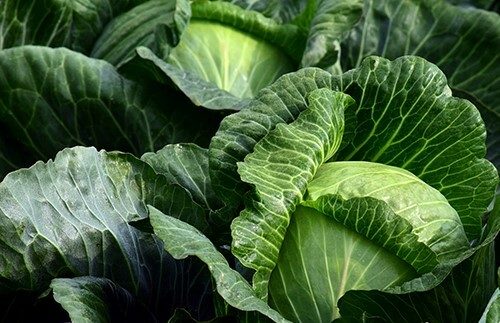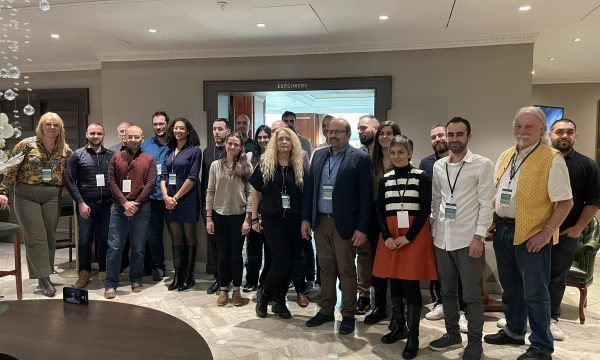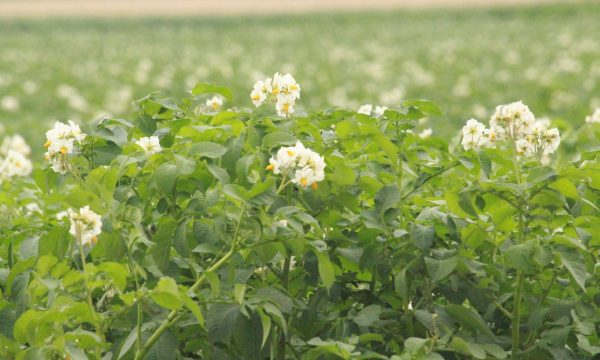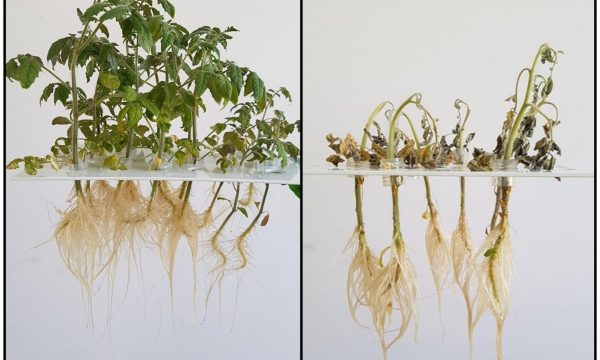Press release The use of bacteriophages to protect cabbage fields, horticulturists wanted

A remarkable new control technique against bacterial disease Xanthomonas is being developed for sprout and cabbage cultivation. This involves the use of bacteriophage (i.e. bacteria-eating) viruses that only attack specific, harmful plant bacteria.
Promising results
The bacterium Xanthomonas can cause serious damage in outdoor vegetable cultivation. In bad years, up to 30% of the harvest is lost to the bacterium. So far little can be done, except to eliminate the damaged crops. If the phage technique performs as well in practice as it does in the trial environments, this could make a big difference for vegetable growers. "If you halve the loss of production, you will gain around 10 million euros extra added value per year in Flanders.
"After 7 years of research work in laboratories and experimental greenhouses, the method has already been tested for the first time in a field trial environment on three locations in Flanders. The results are promising: we measure 15 to 20% less infection with one treatment. That percentage is expected to be even higher. European approval as a new crop protection product does require a long, difficult procedure," says Johan van Vaerenbergh (ILVO).
The results are promising: we measure 15 to 20% less infections with one treatment
Research partners ILVO, KULeuven, Provincial Experimental Centre for Vegetable Cultivation East Flanders (PCG), Experimental Centre for Vegetable Cultivation Sint-Katelijne-Waver (PSKW) and Inagro now want to roll out the technique to practice to a limited extent, in order to optimize disease control. They are looking for vegetable growers with contaminated cabbage fields wishing to advance the research in exchange for a field trial compensation.
Xanthomonas
Infection of the soil with Xanthomonas usually occurs from remains of diseased cabbage crops or via imported contaminated seeds. The bacterium can survive in the soil for at least 2 years. If you then plant cabbage, the bacterium can penetrate through water pores at the leaf edge, and then spread to the whole plant via veins and leaf stalks. The plant eventually dies.
What are phages and how do they work?
Viruses are not always harmful (such as COVID19 for humans). In some cases they are actually useful. For example, a bacteriophage virus, or a phage for short, is only aimed at one specific bacterium with which it feeds. Exactly this strict selectivity can be interesting in crop protection.
The selectivity of the phage is the trump card of this control method: there is no risk that the phage will attack the plant itself, its environment or humans. As soon as the pathogenic bacterium in question has been completely controlled and has disappeared, the phage itself also disappears
Microbiologists have known this for a long time: every type of bacteria in the world has at least one type of phage as its natural enemy. In the sector of bacterial plant diseases it is therefore important to select the right type of phage, to grow that specific phage in a controlled environment and to preventively administer a dose to a potentially infected plant.
Jeroen Wagemans (KULeuven): "A bacteriophage virus really 'seeks' its bacteria. Once it has been found, it penetrates the bacterium in order to multiply itself there. The bacterium eventually bursts open and is destroyed, the new phages are released and in turn look for a neighboring bacterium of the same species to multiply". The process repeats itself until no pathogenic bacteria of the right species can be found in the environment. Sofie Venneman (PSKW): "Administering one dose of phages at the right time is enough to treat a bacterial infection".
The right phage cocktail?
Because the Xanthomonas bacteria occur in different types on the Flemish cabbage fields, and because the phages attack only one type of bacteria each time because they are very picky, the researchers composed and tested a cocktail of different phages. The aim is to achieve the broadest possible applicability with respect to Xanthomonas.
Dominique Holtappels (KULeuven): "It is already clear that the cocktail must continue to evolve over time. Bacteria such as Xanthomonas evolve and can develop resistance to their phages. So each time new specific phages in the treatment mixtures or the already found phages have to be evaluated".
Bacteria such as Xanthomonas evolve and can develop resistance to their phages
Application of the phage cocktail
The phage viruses can be applied to the plant in different ways. The researchers are currently testing whether it is more efficient to spray the phages separately on infected plants, or to administer them via irrigation water. A new way of thinking is to coat the vegetable seeds or administer phages during priming. In this way, preventive work can be done, and the phages could protect the plant against the bacteria, instead of curbing infections. Dominique Holtappels (KULeuven): "Especially that last approach seems promising. We see that during the priming of seeds, the stubborn pathogens are efficiently killed. The bacteria that still reach the plant despite the phage coating seem to lose their power to infect the plant".
Great potential
The research partners ILVO, KULeuven, PSKW, Inagro and PCG have established the theoretical effectiveness of phages against Xanthomonas in plants through lab tests between 2013 and 2016. Sabien Pollet (Inagro): "In the follow-up project (2017 - 2020), in addition to the lab and greenhouse trials at three locations in Flanders, we organized field trials to measure the effects of the phages in a more practice-oriented environment. With one treatment, we easily measure 15 to 20% reduction of the infestation, but that is on cabbage plants that we artificially contaminated with a heavy dose of Xanthomonas". The healing percentage should be even higher, by further optimizing the application and the cocktail.
Wanted: farmers with infested cabbage
In order to test these innovations, the researchers wish to enlist the help of cabbage farmers. They can make an important contribution to the research at this early stage. Louis Lippens (PCG) : "We ask farmers to inform PCG when they see bacterial wilting on their 2020 cabbage. Instead of removing the plants, we will then administer a phage treatment. This allows us to monitor how the treatment works in real conditions, at a realistic infection rate and on fields that are normally treated. For the cabbage on the part of the field that has been treated with the as yet unregistered phages, and which are thus unsellable, the farmer receives a financial compensation".
We ask farmers to inform PCG when they see bacterial wilting on their 2020 cabbage. Instead of removing the plants, we will then administer a phage treatment.
Final market admission as a method? Not yet – first it needs to be "Generally Regarded As Safe" (GRAS).
The recognition of the (innovative) phage-bio control against plant diseases falls under the European pesticide legislation. Before the candidate treatment can be commercialized, it has to pass strict prescribed European safety testing procedures, which are thorough and expensive. "This scares off the often smaller companies that want to start with phage therapy, or it has a strong delaying effect, while there are currently no other treatment methods available", according to the phage researchers of ILVO, PCG, PSKW, Inagro and KULeuven. They make an explicit plea for a European application of the "GRAS principle" already used in the United States. GRAS, or "Generally Regarded As Safe", means that a new product does NOT have to go through the full standard approval procedure IF there is consensus among scientific experts on safety for use in food. "We are already working to further increase the efficiency of phages, and a procedure for large-scale phage culture already exists. If Europe would allow the GRAS principle here, phage bio-control could quickly reach the market".
More info? Reports of infections? Want to help as a trial farmer?
Please contact one of these knowledge centers:
- in East Flanders: Louis Lippens (PCG): louis@pcgroenteteelt.be
- in West Flanders: Sabien Pollet (Inagro): sabien.pollet@inagro.be
- in Antwerp, Limburg and Flemish Brabant: Sofie Venneman (PSKW) sofie.venneman@proefstation.be.


